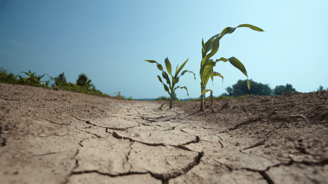Between the Lines: Healthcare’s Answer to Climate Change
‘We must fight one of the world’s biggest health threats: climate change’ WHO (2023)
‘If the health sector were a country, it would be the fifth largest emitter on the planet’ Health Care Without Harm (2019)
The statements above represent the interlinked reality and siloed mentality the development world traditionally uses to tackle sectoral issues. Viewed together, they point to a conflicting problem: to address the threat to global health we must tackle climate change; to address the threat of climate change we must reduce emissions from global health. Whilst this may appear an inescapable loop, interdisciplinary mindsets can lead to solutions. At SRI Executive, our partners in global health and sustainability recognise the need to confront these inextricably connected challenges in a new and innovative way, which will be explored in this paper.


The planet has a fever, and we need to start medicating differently.
Climate Change as a Health Risk Multiplier
The united crescendo of events in 2023 in both the climate and health sectors demonstrates the urgency facing us in real terms. The world experienced the hottest year on record at 1.48 degrees above pre-industrial times. Simultaneously, dengue infections soared. In Brazil, dengue cases are predicted to surpass five million in 2024, which is three times the number of cases reported in 2023, due to extended breeding seasons of mosquitoes and extreme weather. Twenty-two European countries identified the mosquito responsible for dengue present in their borders and Chad experienced its first outbreak as climate warming expands the mosquitos' habitual zones.
As ocean temperatures increase due to global warming, natural ocean convection alterations become more extreme, increasing extreme weather due to stronger El Niño’s. Pakistan is still battling with floods a year after one-third of its landmass became inundated, sub-Saharan Africa is experiencing extreme drought and wildfires have devoured landscapes in the US, Australia, and the Mediterranean. These events have increased by 130% since pre-industrial times, with the frequency of extreme El Niño changing from 1 in 22 years to 1 in 10 years.
Increased extremity and frequency of weather events directly affect global health through i) forced displacement ii) increased food and water insecurity and iii) increased communicable diseases. Non-communicable disease cases are also rising due to pollution and declining mental health. Since 2000, researchers predict that at least four million deaths have been caused by climate change globally.
Damage to infrastructure through extreme weather multiplies health risk, as the ability to treat people is compromised. In the Americas, 67% of healthcare facilities are in areas at risk of disaster. In the last decade, 24 million people were unable to access healthcare due to a lack of resources to rebuild and react to extreme climatic events.
The effects of climate change on health are often experienced more acutely in low- and middle-income countries, even though they contribute the least to global warming. The African continent contributes <4% to Green House Gas (GHG) emissions; but experiences 35% of global mortality due to climate change. This highlights historical injustices reflected in the resilience of health systems and calls for new approaches to management.
Healthcare is in a battle against climate change; however, the health industry is also accelerating the climate crisis.

Global Health as a Climate Change Contributor
The global health industry is responsible for 4.4% of all GHG emissions driving climate change and is predicted to triple in size by 2050 to meet demand. Currently, over half of the sector’s emissions are attributable to energy use. This includes electricity, gas, steam, aircon and operational emissions used within hospitals, plus supply chains ranging from the production and transport of vaccines to the growing of cotton for medical gowns. Due to the health sector’s size, accounting for 10.3% of the world’s GDP, there is a belief that “greening” the sector could function as a catalyst for greening other industries. It also highlights a major flaw in the distribution of climate finance, as only 0.5% of multilateral climate funding goes towards greening the health sector.
‘Greening’ is important to strive for, not only to stop exacerbation of disease transmission, but to prevent disease emergence. As human activities driving climate change such as deforestation, mining and intensive agriculture engulf more of our natural environment, there is a greater chance of a previously untouched disease pool entering into the human population. Intensive farming of animals has also created a new interface for diseases to exploit, as the mass collective of genetically similar animal bodies provides a ‘training camp’ for disease. These problems impact multiple sectors: climate change, global health, food and agriculture, conservation, resource management, governance and many more. It has never been more important to examine the source of problems and find multisectoral responses.
The inequality of global GHG emissions is mirrored in health sector emissions, with North America (29% healthcare’s emissions) generating more than the Middle East, North Africa and Sub-Saharan Africa combined (estimated at 14% healthcare’s emissions through missing data). This demonstrates how the fight for greening the sector is also a fight for justice and equality. The imbalance shows the need for the dispersal of medical knowledge and expertise to combat historical power tendencies.
Recognition of the link between health and climate is growing. COP28 included the first ever ‘Health Day’, reflecting the need for interdisciplinary discussions and skill sets. However, despite an increase in conversation, we know there is a significant lag time between discussion and implementation. At a recent online seminar hosted by SRI Executive, Dr Peter Piot, SRI Executive Advisor, Director of the London School of Hygiene & Tropical Medicine, and Professor of Global Health, noted that it was refreshing to have a cross-disciplinary discussion as usually ‘health just speaks to health.’ There is a wealth of knowledge lost between disciplines that could be harnessed to tackle the connection between the global health industry and climate change.
How can organisations adapt and prepare for change?
We have identified three key challenges for the health industry: i) to prepare and respond to a higher frequency and severity of existing diseases and emergence of new health threats; ii) the greening of health operations to achieve Net Zero by 2050; and iii) to increase the resilience of health facilities to extreme weather events.
Based on our extensive experience working within global development through partners such as the World Health Organisation and the World Bank, SRI Executive has identified some of the immediate steps organisations can take internally to confront these challenges. Steps include i) strengthening leadership, including the ability to navigate interdisciplinary topics, ii) new managerial skills found outside the traditional bounds of the health and climate sectors; iii) development of capacity to prepare and respond to the changing climate and health landscape.
We have expanded on how organisations can enforce these changes below.

Strengthening Leadership
Strong leaders are essential to ensure organisations remain responsive and resilient to change. In the wake of the compounding health and climate challenges, strengthening leadership must take a holistic approach: from the appointment of the right individual to ensuring continued accountability and performance development.
Through effective searches, organisations can find leaders with the right combination of experiences, capabilities, and behaviours needed to navigate interdisciplinary challenges. The newly appointed Mafalda Duarte, Executive Director of the Green Climate Fund (GCF), recently reiterated the need to start using health as a 'lever'’ for climate change, championing the use of more cross-cutting and collaborative approaches. This indicates the direction leaders must strive for, and SRI was proud to support GCF in their search and appointment for this role.
After their appointment, leaders must be effectively onboarded and integrated into the organisation and its ecosystem. Accountability is essential for the continued success of these leaders. Having facilitated multiple performance assessments of Executive Directors, Presidents, and other Senior Leaders, SRI Executive knows how complex these processes can be. Yet, done properly, they are an invaluable tool in leaders’ accountability and professional development.
If you’d like to learn more about how SRI Executive can support the appointment, development, and advisory of leaders, get in touch.

Beyond the Bounds of Sectors
Working in effective partnerships to address complex challenges continues to be a major trend in the development sector, and a means to achieving impact at scale. The Sustainable Development Goals (SDGs) and the Paris Climate Agreement call for more effective multi-stakeholder partnerships that span sectors and constituencies towards a shared future.
In a world where donors are demanding value for money and efficiencies in a crowded landscape, alliances are a mechanism to respond to operational drivers and leverage strengths. Operating in coalitions, consortia and through partnerships can offer considerable opportunities.
Partnerships and alliances between organisations have historically been focused on either global health or climate change. Now, there is an opportunity to leverage existing skills and expertise for more collaborative solutions across the sectors.
While alliances can maximise organisations’ impact, they are not to be undertaken lightly. Through our experience in supporting organisations, we find that forming strong, mutually beneficial alliances requires substantial due diligence and relationship building to create trust and co-define commitments and ways of working.
Using our extensive knowledge and network across global development sectors, SRI Executive ‘connects the dots’ between organisations and highlights opportunities for constructive interaction. If you are interested in finding a new partner, or forming a strategic alliance, we would be delighted to share our best practices and processes to help guide your journey.

Capacity Building and Ensuring Effective Strategy
Effective organisational strategies in climate and health are essential. With guiding strategies, organisations can contribute towards efforts to stay below the 1.5-degree threshold, set actions to decouple from fossil fuels, and develop interdisciplinary mindsets which ensure climate adaption funds are being invested in the areas they will be most impactful.
Having worked with many organisations to develop, implement, and evaluate organisational strategies, SRI Executive understands the components needed to remain true to an organisation’s mission and unique value, while retaining flexibility to respond to internal and external change. Integrating a response to climate change for instance, has been a key part of many of our strategy processes.
In the wake of international political upheaval, climate change, and the need to consolidate market actors, Fairtrade International partnered with SRI Executive to develop their 2021-2025 Global Strategy. Through extensive consultation and analysis across a federated network of 23 CEOs, a new governance model and decision-making structure was created, strengthening Fairtrade International in its operating environment.
If you would like to learn more about how you can build, develop and evaluate an effective organisational strategy which is responsive to external change, please visit our Strategy page.
To New Horizons
While the compounding effects of climate change on global health and vice versa present a complex challenge, we are excited by the opportunity to connect and support individuals and organisations who are working to find innovative solutions.
SRI Executive continues to stay abreast of global and local trends with our network of expert advisors in health and climate change, inhabiting the overlooked space of development in between the lines.


